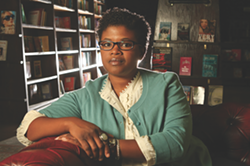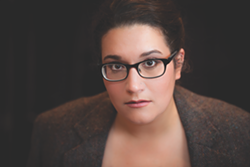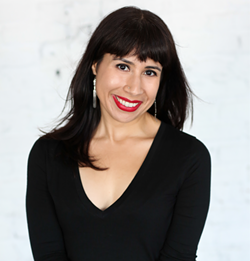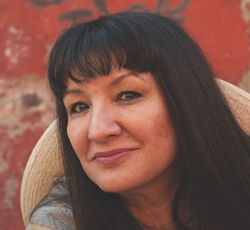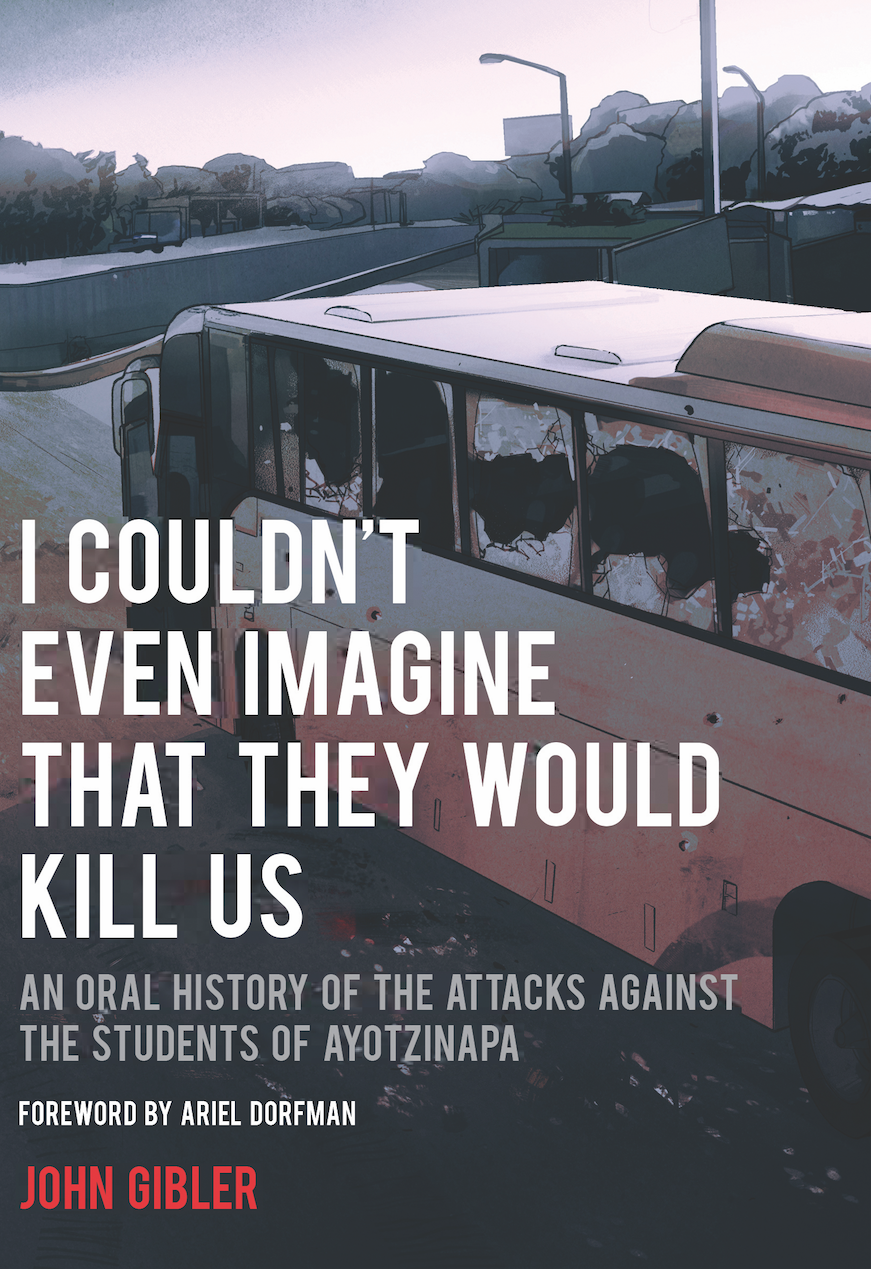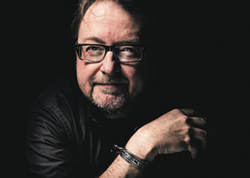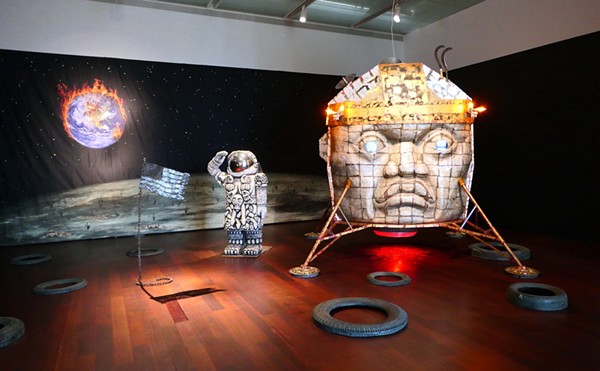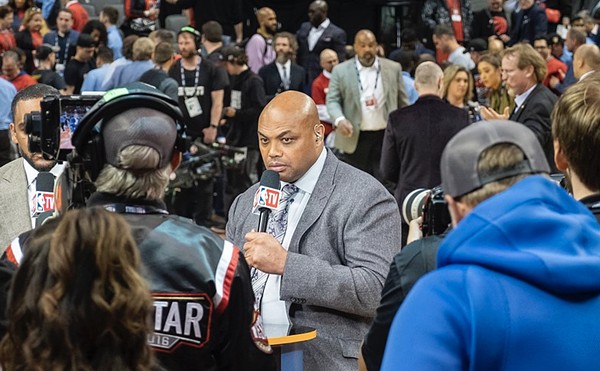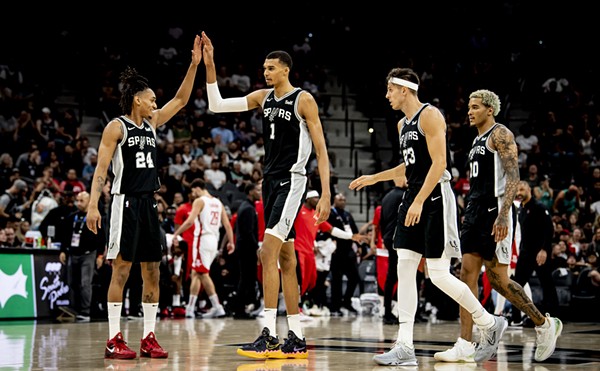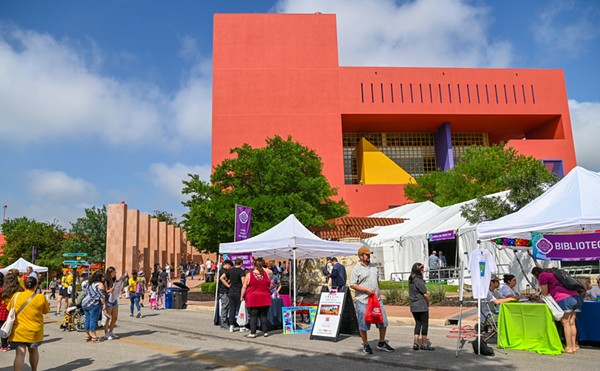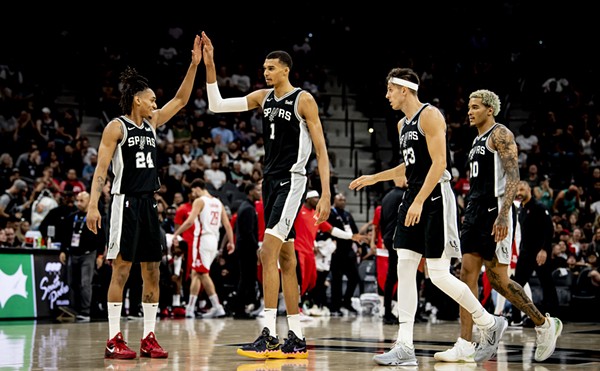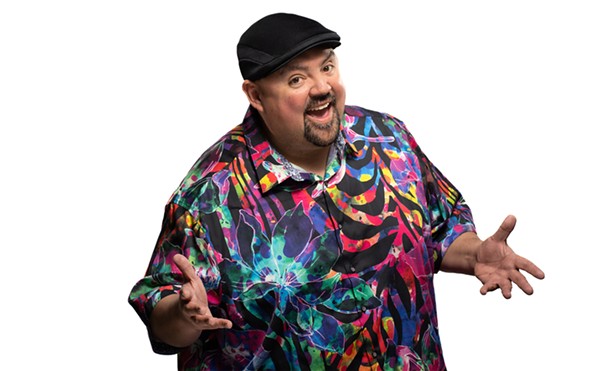The one-day literary onslaught, which boasts a little something for readers of every age group and interest, has brought in some fantastic authors and hosted some thoughtful and enriching panels over the years. It also has enjoyed consistently increasing attendance numbers, though gains have become more modest in recent years.
From year one to year two, and from year two to year three, SABF saw its attendance double: from 4,000 attendees to 8,000, and then to 16,000 in year three. But this rapid growth quickly trailed off, with year four attendance at 18,000 and year five at 20,000. This year’s attendance is expected to be about the same as last year’s, which means the festival is at a point where, with attendance numbers threatening to plateau, it must keep its established excellence, while looking for new ways to grow its reach.
We caught up with SABF literary director Clay Smith last week to chat about his role in planning the fest, particular points of interest in this year’s programming, and the difficulties in building a robust book festival from scratch in a city that has never had one.
Smith, who also serves as editor-in-chief of Austin’s renowned publication Kirkus Reviews and was the former literary director of the Texas Book Festival — a more established affair, which has been running since 1996 — told the Current “it has been a joy to be involved with SABF from the beginning, because I’ve been able to see it grow and help foster that growth.”
“On the flipside,” Smith said, “it can be a unique challenge, because we are still in a stage of development where we have to really show people what a book festival can be.”
In his role, which is very much a curatorial one, Smith considers trends in the publishing industry, but more importantly thinks about the ideas and issues that are of concern to San Antonio, and then tries to bring “authors that are writing thoughtfully about those ideas and issues.”
“As a curator,” he explained, “you have to be really open to the idea that you don’t know everything — you have to be open to the possibility of an author submission or a direction of thinking changing what you thought was your plan.”
Smith knows that there is still work to be done in growing the SABF. “I really think that a lot of people think it’s like some version of the book fairs they remember from elementary school or something,” he mused.
Apart from logistical considerations like finding ways to grow the festival’s footprint and increasing year-round educational outreach, Smith said it is imperative to get the word out that this is “not merely a book sale, nor is it a lecture series, but it is a real chance for education and engagement.”
“We have to show people that a book festival is really not just about books, but it’s about exploring these ideas that they are thinking about already anyway,” he remarked.
It’s true. Based on our dig through this year’s schedule, it’s plain to see that even someone who is not an avid reader, up on the latest trends in the literary world, can find panels that will enrich their thinking about (or possibly introduce them to) any number of important and interesting topics. Plus: it’s free and there’s food and booze and stuff for the kiddos to do.
Smith mentioned that one clear programming difference that’s emerged in this year’s SABF, largely without too much intentional forethought, is an increased focus on nonfiction works, authors and panels.
“We always do our part to program across the board, genre-wise, but this year we ended up with tons of nonfiction,” he said. “I think that’s where readers are now — we all have a greater need for fact than maybe we thought we did in the past.”
“A book or even a panel is wonderful in this regard because in can provide deep context like no article or news report could,” he offered.
For those of us who don’t need any convincing, who already think San Antonio deserves a truly world-class book festival, the best thing we can do is attend and engage with the one we’ve got. That’s how we help it become all that it can be.
Below, find a thematically organized list of 15 SABF panels that we have our hearts set on. See festival.saplf.org for a complete listing, a festival map, and other pertinent information.
When the Gun Goes Off: Two Novelists Tackle Race & Class
In this panel discussion moderated by Austin novelist Amanda Eyre Ward, celebrated novelists Jardine Libaire and Attica Locke will explore the troubling and knotty intersections of race, class, violence and guilt in American society. Both Libaire and Locke tackle these issues in their fiction (especially Bluebird, Bluebird and White Fur, respectively) and can help, perhaps in interesting ways that writers of nonfiction could not, provide psychological and social insights into what have been and remain some of our nation’s most pressing issues. Free, 10-11am (book signing at 11:15am) Sat, Apr. 7, Southwest School of Art, Santikos Building, Ellison Room, 1201 Navarro St., festival.saplf.org.
Jorge Ramos on the Challenge of Being a Latino Immigrant in the Trump Era
Veteran journalist, news anchor and author Jorge Ramos has been writing about, speaking about and investigating the Latinx immigrant experience for most of his 30-plus-year career. His efforts have earned him Emmy awards, a Walter Cronkite Award for Excellence in Journalism, and many other well-deserved accolades. Leading up to the 2016 election and since, Ramos’ work has found a growing audience and taken on a renewed sense of urgency as Trump and his administration have ratcheted up the attacks on Latinx immigrants and, in so doing, forced more and more people to grapple with their place in the United States. His latest book, which came out in February and will take center stage in this discussion with Robert Rivard, is titled Stranger: the Challenge of a Latino Immigrant in the Trump Era. Free, 12:30-1:15pm (book signing at 1:30pm) Sat, Apr. 7, Central Library Plaza, The EY Tent, 600 Soledad St., festival.saplf.org.
Carmen Maria Machado on Her Short Story Collection
This discussion between young but already widely celebrated author Carmen Maria Machado and Latinx literature teacher Jackie Cuevas, who is the author of the just-published book Post-Borderlandia: Chicana Literature and Gender Variant Critique, will focus on Machado’s collection of short stories Her Body and Other Parties. The collection, which was a finalist for the National Book Award, the Kirkus Prize and the L.A. Times Book Prize, is a genre-defying affair that deftly weaves between the lanes of realism and sci-fi, comedy and tragedy, while exploring the multi-faceted and often traumatic experience of being a woman with a body in contemporary America. Free, 1-1:45pm (book signing at 2pm) Sat, Apr. 7, Southwest School of Art, H-E-B Coates Chapel, 300 Augusta St., festival.saplf.org.
I Am Not Your Perfect Mexican Daughter In this discussion, moderated by librarian Esperanza Garza-Danweber, poet, novelist and essayist Erika L. Sánchez will discuss her 2017 YA novel I Am Not Your Perfect Mexican Daughter. The novel, which delves into the often antiquated and unfair expectation placed upon the children of Mexican immigrants, follows 15-year-old Julia Reyes as she navigates not only the loss of her sister, but her own budding identity and how it conflicts with what her parents want from her. Reyes finds that, as she comes to understand her deceased sister and herself with greater clarity, perhaps her sister, always favored by their parents, wasn’t as “perfect” as she seemed to be. Free, 2-3pm (book signing at 3:15pm) Sat, Apr. 7, Whataburger Geektown HQ, 300 Augusta St., festival.saplf.org.
So You Want to Talk About Race
Ijeoma Oluo’s book So You Want to Talk About Race offers a “contemporary, accessible take on the racial landscape in America, addressing head-on such issues as privilege, police brutality, intersectionality, micro-aggressions, the Black Lives Matter movement, and the ‘N’ word.” In discussion with Kalia Glover, a UTSA scholar specializing in critical race theory and U.S. racial history, Oluo will further explore some of the hard-to-ask (and hard-to-answer) questions at the heart of her important book. Free, 2-2:45pm (book signing at 3pm) Sat, Apr. 7, Southwest School of Art, H-E-B Coates Chapel, 300 Augusta St., festival.saplf.org.
Queer Eye: LGBTQ Characters in YA
We’ve come a long way since pioneering books such as Nancy Garden’s Annie on My Mind (1982), Lesléa Newman’s Heather Has Two Mommies (1989) and Michael Willhoite’s Daddy’s Roommate (1991) arrived on shelves and created inevitable waves by placing positive stories of gay parenting and self-acceptance in the hands of young readers. As LGBTQ characters, themes and subject matter infiltrated popular culture in the 1990s and 2000s, the American Library Association took notice and, in 2008, began assembling an annual Rainbow List — “a bibliography of current books for young readers from birth through age 18 dealing with the myriad of gay, lesbian, bisexual, transgender or questioning issues.” Assembled with help from suggestions and a selection committee, the Rainbow List rightfully included Martin Wilson’s What They Always Tell Us in 2009 and Benjamin Alire Sáenz’s Aristotle and Dante Discover the Secrets of the Universe in 2013. Dealing with gay coming-of-age from two distinct perspectives, both books were recognized by Lambda Literary, an organization founded in 1989. Born in Alabama and based in New York, Wilson contributed essays, short stories and book reviews before publishing What They Always Tell Us, a debut novel following two high school-aged brothers (one gay, one straight) as they grapple with the looming complexities of adulthood. El Paso-based Sáenz, who didn’t come out until he was in his 50s, might’ve found adolescent courage in his own tale of Aristotle and Dante. Mexican-American teens named after legendary thinkers, Ari and Dante embody the fear, uncertainty and eagerness of the gay coming-of-age experience while also challenging racist rhetoric. Sure to touch on the continued evolution of young-adult fiction aimed at LGBTQ readers, Wilson and Sáenz’s San Antonio Book Festival panel is moderated by Jeanette Honermann, an outdoors enthusiast and self-described “recovering bureaucrat.” Free, 3:15-4:15pm (book signing at 4:15pm) Sat, Apr. 7, Whataburger Geektown HQ, 300 Augusta St., festival.saplf.org.
Literary San Antonio
Although San Antonio ranks among the least literate cities in the nation, it boasts a unique literary history and has served as a muse for countless authors — from famous visitors to the contemporary authors who call it home. The 19th-century icon O. Henry (born William Sydney Porter) set his short stories “A Fog in Santone” and “The Higher Abdication” here; Victorian dandy Oscar Wilde found “a thrill of strange pleasure” here when he came to lecture locals on decorative art back in 1882; and Pulitzer-winning author Larry McMurtry famously wrote in his book Narrow Grave: Essays on Texas that “San Antonio has kept an ambiance that all the rest of our cities lack.” Combining both familiar and lesser-known anecdotes with reminders of San Antonio’s position at a cultural crossroads, its role in the Mexican Revolution, its cultural contributions to the Chicano movement, and plenty in between, the recently published Literary San Antonio sets out to build a literary portrait of the Alamo City through the words of more that 40 writers. Edited by author, poet and Wings Press publisher Bryce Milligan and timed with the San Antonio’s Tricentennial, the book digs deep to include lyrics translated from a Comecrudo dancing song, a passage penned by alleged Battle of the Alamo survivor Madam Candelaria (born Andrea Castanon Villanueva) and local labor hero Emma Tenayuca’s 1939 essay “The Mexican Question in the Southwest.” But it also offers a broad sweep encompassing many (admittedly not all) of San Antonio’s contemporary talents. Promising one of the festival’s most relatable, accessible offerings, Literary San Antonio comes to light in a panel moderated by Milligan and featuring authors Cary Clack (the first African American on the editorial board of the Express-News), Laurie Ann Guerrero (former Poet Laureate of both San Antonio and Texas), Stephen Harrigan (screenwriter, historian and Texas Monthly contributor) and Naomi Shihab Nye (poet, local treasure and National Book Award finalist). Free, 10-11am (book signing at 11:15am) Sat, Apr. 7, Southwest School of Art, Santikos Building, Rogers Hall, 1201 Navarro St., festival.saplf.org.
Beloved Icon Sandra Cisneros
Decorated author and MacArthur “Genius” Grant recipient Sandra Cisneros departed San Antonio years ago after living here off and on for nearly three decades, but her work and spirit still feel ever-present. Essentially a coming-of-age collection of vignettes, her cherished novel The House on Mango Street has been translated into more than 20 languages, served as inspiration for the traveling exhibition “The House on Mango Street: Artists Interpret Community” and been adapted as a play the Classic Theatre of San Antonio produced in 2016 to great acclaim — and the approval of Cisneros herself. The following year, the Wittliff Collections at Texas State University unveiled The Cisneros Papers, an archive assembled from 300 boxes of photographs, videos, awards, interviews, drawings and journals revealing early versions of her stories and poems. And then there’s the Macondo Writers Workshop Cisneros famously founded here around her kitchen table in 1995. Named after the mythical town introduced in Gabriel García Márquez’s 1967 novel One Hundred Years of Solitude and geared for socially engaged writers who “work on geographic, cultural, economic, gender, and spiritual borders,” the workshop will be held July 24-29 this year on the San Antonio campus of Texas A&M University. Presently based in San Miguel de Allende, Cisneros returns to her former home for a San Antonio Book Festival discussion moderated by Ito Romo, a St. Mary’s University professor known best for his 2013 novel The Border Is Burning. Free, 11:15am-noon (book signing at 12:15pm) Sat, Apr. 7, Central Library Plaza, The EY Tent, 600 Soledad St., festival.saplf.org.
Thanks, Obama: My Hopey Changey White House Years
If you were among the many who attended the The Moth Mainstage storytelling event during last year’s festival, then you’ve likely got a fond memory of David Litt’s amusing presentation “Have You Met Him Yet?” As a senior at Yale, Litt admits he was “one of those young people who became obsessed with Barack Obama.” Upon graduating in 2008, he moved to Ohio to work as a field organizer on Obama’s campaign and then moved to Washington D.C., interned for a bit and, much to his surprise, landed an entry-level White House job as a speech writer. Unsure of his new role and even suspicious that “somebody had made a mistake” by hiring him, Litt claims he blacked out the first time Obama spoke to him. The native New Yorker ultimately redeemed himself first by writing a Thanksgiving video address and then a joke and concept for a TV segment for an NBC special celebrating Betty White’s 90th birthday. While Litt had hoped he’d find a way to help the president be “just a tiny bit better at his job,” he never guessed it would have anything to do with the Golden Girls theme “Thank You for Being a Friend” — which he sang to Obama to set the mood for the taping. Over the course of five years at the White House, Litt rose to the position of senior presidential speechwriter (and the less-official “comic muse for the president”). Currently the head writer/producer for the D.C. office of Funny or Die, Litt joins moderator Gilbert Garcia (metro columnist for the Express-News) for a discussion about his 2017 memoir Thanks, Obama: My Hopey, Changey White House Years. Free, 2:30-3:15pm (book signing at 3:30pm) Sat, Apr. 7, Southwest School of Art, Santikos Building, Rogers Hall, 1201 Navarro St., festival.saplf.org.
Dispatches from the Borderlands: The Human Face of Immigration
This panel discussion, which will focus on truth and perception of the U.S.-Mexico border, will feature former Border Patrol agent and Fulbright Scholar Francisco Cantú, whose recently published memoir The Line Becomes a River takes a frontline, first-person look at the border and its issues, and Stephanie Elizondo Griest, whose travel memoirs, especially Mexican Enough: My Life Between the Borderlines and All the Agents and Saints: Dispatches from the U.S. Borderlands, explore the ways in which the imaginary borders we create and maintain can have lasting effects on individuals. This discussion will be moderated by Raúl Lomelí-Azoubel, board chairman of SABEResPODER, an organization dedicated to the empowerment of the U.S. Latinx community. Free, 10-11am (book signing at 11:15am) Sat, Apr. 7, Central Library, Auditorium, 600 Soledad St., festival.saplf.org.
The Most Dangerous Man in America: Timothy Leary, Richard Nixon and the Hunt for the Fugitive King of LSD
Of all the books highlighted in this year’s festival, The Most Dangerous Man in America might be the one we’d most like to see turned into a film. Cowritten by the PEN USA Award-winning team of Steven L. Davis and Bill Minutaglio (Dallas 1963), it blends research, interviews and “freshly uncovered primary sources” to create a portrait of America unraveling amid the chaos of the Vietnam era. Not unlike our current reality, it proves that truth can indeed be stranger than fiction. Built around an increasingly unstable (and drunk) President Nixon’s obsession with bringing down the “High Priest of LSD,” the story begins in 1970, the year Leary announced his candidacy for governor of California — only to be arrested for possession of two marijuana cigarettes and sentenced to 10 years in prison. What ensues is a 28-month escapade that encompasses Leary’s escape from prison with assistance from domestic terrorists, his exile in Algeria under the protection of Black Panthers, and his eventually recapture by American agents in Afghanistan. In the words of Pulitzer-winning journalist Glenn Frankel, it’s “more wild, inventive, and sex-drenched than a Dennis Hopper movie.” Moderated by Martin Acevedo, the duo’s San Antonio Book Festival panel is sure to conjure hazy nostalgia for Leary’s “turn on, tune in, drop out” generation. Free, 11:15am-12:15pm (book signing at 12:30pm) Sat, Apr. 7, Central Library, Festival Room, 600 Soledad St., festival.saplf.org.
Thursday Night Lights: The Story of Black High School Football in Texas
In this special talk, which takes its name from the book by Michael Hurd, journalist Cary Clack will chat with Hurd about his research into the history of black high school football in Texas. Hurd, who is director of the Texas Institute for the Preservation of History and Culture at Prairie View A&M University, will take attendees on a journey through the segregated days, when black football teams played on Thursdays, while white teams got the Friday night spotlight. Free, 12:30-1:15pm (book signing at 1:30pm) Sat, Apr. 7, Central Library, Launch SA, 600 Soledad St., festival.saplf.org.
What We Don’t Talk About When We Talk About Poverty
Hosted by Texas Public Radio’s David Martin Davies, this panel will feature an in-depth (though not necessarily merely academic) look at systemic poverty in the U.S. — to include its roots in the capitalist vision and its potential remedies. The books that will serve as jumping-off points for the discussion are The Kings of Big Spring by Bryan Mealer, Bad Jobs and Poor Decisions: Dispatches from the Working Class by J.R. Helton, and House Built on Ashes by José Antonio Rodríguez. Through a combination of storytelling, personal anecdote and research analysis, these authors will also look at the maturation of American capitalism and how the system has made it increasingly harder for folks to leave poverty behind. Free, 1:30-2:30pm (book signing at 2:45pm) Sat, Apr. 7, Central Library, Auditorium, 600 Soledad St., festival.saplf.org.
I Couldn’t Even Imagine That They Would Kill Us: The Attacks Against the Students of Ayotzinapa
In this difficult-to-face but important discussion, Express-News columnist Elaine Ayala will talk with journalist and author John Gibler about his book that gives the panel its title. The discussion, like the book, will focus on lending voice to the community surrounding the September 26, 2014, incident in which police in Iguala, Mexico, attacked five busloads of students and a soccer team, killing six people and abducting 43 students. Gibler, who arrived on the scene within days of the horrible incident, does the important work of chronicling the events and the government cover-up that followed. Free, 1:45-2:30pm (book signing at 2:45pm) Sat, Apr. 7, Central Library, Latino Collection Resource Center, 600 Soledad St., festival.saplf.org.
Luis Alberto Urrea’s Broken Angels
As overused as it may be, NPR’s oft-quoted summation of esteemed author Luis Alberto Urrea kind of takes the fun out of trying anything else: “Compassionate but hard-edged, a kind of literary badass who still believes in love, because sometimes, there’s nothing much else to believe in … a master storyteller with a rock ’n’ roll heart.” Raised in Tijuana by an American mother and a Mexican father, Urrea draws literary inspiration from his “dual-culture life experiences to explore greater themes of love, loss and triumph.” Although best known as a chronicler of life and death along the U.S.-Mexico border, he’s also charmed readers with mystical and politically driven poetry (The Tijuana Book of the Dead) and compelling short stories referencing moody rockers spanning from the Velvet Underground to Depeche Mode. For his 2004, Pulitzer-nominated nonfiction The Devil’s Highway, Urrea worked with Border Patrol trackers to excavate the stories of 26 men who attempted to cross into the U.S. from Mexico. Although more than half perished in their journey along an unforgiving stretch of southern Arizona, Urrea retraced their footsteps to reveal the “catastrophic political malfeasance that forced the walkers to flee their homes and bake to death in the western desert.” The revered author returns to San Antonio for a panel (moderated by SABF deputy executive director Lilly González) in support of The House of Broken Angels, “the story of an American family — one that happens to speak Spanish and admire the Virgin of Guadalupe. Imperfect and glorious, messy and hilarious, sometimes heroic.” Free, 3-3:45pm (book signing at 4pm) Sat, Apr. 7, Central Library Plaza, The EY Tent, 600 Soledad St.,festival.saplf.org.
San Antonio Book Festival
Free, 9am-5pm, Sat, April 7, San Antonio Public Library (600 Soledad St.) and Southwest School of Art (300 Augusta St.), (210) 225-4728, festival.saplf.org. Get our top picks for the best events in San Antonio every Thursday morning. Sign up for our Events Newsletter.


